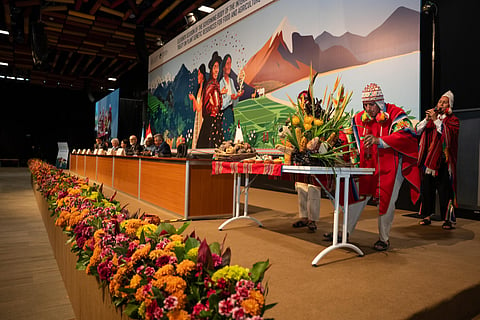

Countries gather in Lima for the ITPGRFA meeting face rising concern over Digital Sequence Information (DSI).
UN Special Rapporteur Michael Fakhri warns digital data could undermine farmers’ rights and seed sovereignty.
Critics say companies are using DSI to claim intellectual property without sharing benefits with farming communities.
The Treaty’s Multilateral System has facilitated millions of exchanges but delivered little benefit-sharing.
Negotiators are being urged to bring DSI formally under the Treaty and resolve overlaps with the Convention on Biological Diversity.
Digital genetic data from seeds is emerging as one of the most contentious issues at global food security talks in Lima, with a United Nations expert warning it could undermine farmers’ rights and the very purpose of the international seed treaty.
The 11th session of the Governing Body of the International Treaty on Plant Genetic Resources for Food and Agriculture (ITPGRFA) is taking place in Lima, Peru from November 24-29, 2025. One of the biggest issues at the start of the talks is the potential impact of Digital Sequence Information (DSI) on the Treaty’s core purpose.
In a recent letter to the Chair of the Treaty Alwin Kopse, UN Special Rapporteur on the right to food Michael Fakhri warned that DSI could fundamentally undermine the Treaty’s mandate.
DSI refers to the digital form of genetic information from seeds. Companies are increasingly using this data to study and identify useful traits, and then claim intellectual property over them. Critics say this allows commercial control over seeds without sharing benefits with the farming communities that conserved and developed them over generations.
The Treaty was created to protect farmers’ rights, including saving, exchanging and selling their own seeds. But new patents based on DSI are making these long-standing practices more difficult, even when the seeds originate from the Treaty’s own Multilateral System (MLS). With advanced software, companies can analyse traits digitally and lock in rights over seeds that farmers have maintained.
A factsheet released by Delhi-based think tank Centre for Science and Environment ahead of the meeting notes that while the MLS has enabled the exchange of more than 6.7 million plant genetic resources through 112,000 Standard Material Transfer Agreements, very little benefit-sharing money has reached farming communities. This has raised concerns that the system is enabling access to resources without ensuring fair returns.
Negotiations have yet to clearly bring DSI under the legal scope of the Treaty. Without explicit provisions, private companies can continue to patent traits based on digital data from common genetic resources, turning the Treaty into a tool that enables commercial capture rather than ensuring equitable benefit-sharing. This contradicts the original purpose of the Treaty: to guarantee shared access and shared benefits.
Tensions are also emerging with the Convention on Biological Diversity (CBD), which has recently created a voluntary benefit-sharing mechanism called the Cali Fund for DSI. If applied to crops already covered by the ITPGRFA, observers say this could weaken the Treaty and diminish its authority over its own system. There is concern that the CBD’s approach should apply only to genetic resources outside the ITPGRFA system; otherwise, the integrity of the Multilateral System could be eroded.
Fakhri’s letter has warned that the current trajectory threatens not just the rules on paper, but the right to adequate food itself. Seeds remain central to farmers’ livelihoods and food security.
He suggested that the Governing Body should:
Investigate the conflict between the CBD’s new fund and the Treaty’s existing rules.
Formally bring DSI under the Treaty, ensuring binding benefit-sharing commitments.
Pause rule changes until the real-world impact of open DSI access is fully assessed.
Countries are also being asked to clarify what steps they have taken in national law to safeguard farmers’ rights in the age of digital genetics, and whether they have examined how unrestricted access to DSI would affect farmers on the ground.